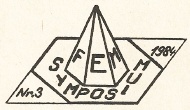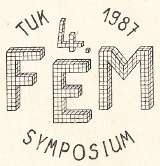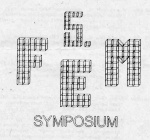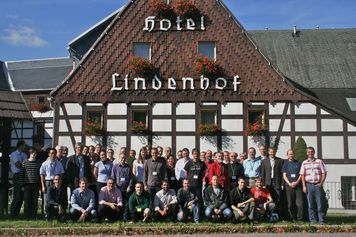History of Chemnitz FEM Symposia
(Symposia on the application and computer
realization of the finite element method) took place in Chemnitz
(Karl-Marx-Stadt ).
November 15 - 16, 1978
Methode der Finiten Elemente und ihre Anwendungen in der Mechanik,
im Bauwesen und in anderen Gebieten der Volkswirtschaft
“Symposium über Anwendungen und rechentechnische Realisierung der FEM”
“2. Symposium über Anwendung und rechentechnische Realisierung der FEM”
November 17 - 18, 1981
Methode der Finiten Elemente (FEM) für lineare und nichtlineare Probleme der Kontinuumsmechanik
FEM und dynamische Probleme
Implementierung effektiver Varianten der FEM
Neue Ergebnisse zur mathematischen Theorie der FEM
October 9 - 10, 1984
Methode der Finiten Elemente (FEM) für lineare und nichtlineare Probleme der Kontinuumsmechanik
Schnelle Auflösung großdimensionierter linearer und nichtlinearer FEM-Schemata
Neuere Ergebnisse zur mathematischen Theorie der FEM
Vergleich der FEM mit anderen Diskretisierungsverfahren
Einsatz der FEM zur Lösung instationärer Probleme
Implementierung effektiver Varianten der FEM
Praktische Erfahrungen bei der Anwendung von FEM-Programmen zur Lösung technischer Probleme
“3. Symposium über Anwendung und rechentechnische Realisierung der FEM”
“4. Symposium über Anwendung und rechentechnische Realisierung der FEM”
December 1 - 3, 1987
Methode der Finiten Elemente (FEM) für komplizierte lineare und nichtlineare Randwertprobleme der Mathematischen Physik
Einsatz der FEM zur Lösung instationärer Probleme
Anwendung der FEM auf dynamische Probleme sowie Eigenwertaufgaben
Schnelle Auflösung großdimensionierter FEM-Schemata
Neue Ergebnisse zur mathematischen Theorie der FEM
Vergleich der FEM mit anderen Diskretisierungsverfahren (FDM, BEM)
Implementierung effektiver Varianten der FEM und praktische Erfahrungen bei der Anwendung von FEM-Programmen
Flexible FEM-Prozessoren zur Lösung von Feldproblemen als ein Grundbaustein anspruchsvoller CAD-Systeme
FEM-spezifisches Pre- und Postprocessing
Anpassung von FEM-Software an neue Hardware-Möglichkeiten
September 18 - 20, 1990
FEM für lineare und nichtlineare Probleme der Kontinuumsmechanik
Schnelle Auflösung großdimensionierter linearer und nichtlinearer FEM-Schemata
Vergleich der FEM mit anderen Diskretisierungsverfahren
Implementierung effektiver Varianten der FEM
Praktische Erfahrungen bei der Anwendung von FEM-Programmen zur Lösung technischer Probleme
Softwaremesse, Postersession, Firmenpräsentationen
“5. Symposium über Anwendung und rechentechnische Realisierung der FEM”
Workshop, February 28 - March 2, 1991
FEM und BEM: Moderne Probleme der Theorie und Anwendung
6th FEM Symposium 1991
Workshop, November 11 - 13, 1992
Aspekte des parallelen wissenschaftlichen Rechnens
Workshop, June 7 - 9, 1993
Paralleles Pre- und Postprocessing in der FEM
Workshop, May 27 - 28, 1994
Parallele Lösung großer Gleichungssysteme
Workshop, September 27 - 30, 1995
Paralleles wissenschaftliches Rechnen in FEM und BEM
FEM Symposia once
more, but to announce them with a limited scope. We decided lately to count
the workshops also as FEM symposia.
Between 1995 and 2005 these symposia were organized by the Chemnitz
SFB 393 ,
supported by the DFG .
Parallel algorithms in solid mechanics
Parallel solvers for finite element equations
Models in structural mechanics
Mortar elements in domain decomposition
Anisotropic discretizations
Parallel adaptive methods
Error estimation
Mesh refinement
Load balancing
Applications in fluid mechanics
Solvers of finite element equations
Applications in structural mechanics
p - and hp -versions of the f.e.m.Implementation on parallel computers
While the previous symposia were announced as German meetings,
English is the official language since 2000.
Finite elements in general
Adaptivity
Anisotropic meshes
Solving the finite element systems
Implementation on parallel computers
Applications to coupled flow problems
Boundary eigenvalue problems
Finite elements in general
Fast solvers
Error estimators
High order methods
Parallel implementation
Modern aspects of mixed formulations
(in particular Stokes problem and Mindlin-Reissner plates)
Discontinuous Galerkin methods
Finite elements in general
Fast solvers
Adaptive methods
Parallel implementation
High order methods
solution of elastic contact problems
anisotropic mesh generation and error estimation
wavelets discretizations
PDEs in finance
fast solvers, e.g.
domain decomposition methods,
multi-level methods,
for hp-methods,
using H-matrices,
simulation of materials with nonlinear properties, e.g.
deformation,
damage,
crack propagation,
mixed formulations,
problems with anisotropic solution.
adaptive methods,
parallel implementation,
high order methods,
error estimation,
fem with stochastic data,
singular complement methods,
sparse approximation, H-matrices.
variational inequalities - contact and free boundary value problems
partial differential equations in optimization and optimal control
special treatment of singularities and singularly perturbed problems
parabolic and time-dependent problems
finite element methods for Maxwell's equations
finite elements for advanced problems in solid mechanics
[non-symmetric] saddle point problems
inverse problems for PDEs
Computational Fluid Dynamics
Contact problems and large deformations
Mortar methods / Discontinuous Galerkin methods
Solvers and preconditioners
Finite Elements in Biomechanics and Biomedicine
Shells and Plates
PDEs on surfaces
Solver and Domain Decomposition
Sensitivity Analysis and Algorithmic Differentiation for FEM
FEM for Maxwell's Equations
Flow Problems, Adaptive Methods, Optimal Control
Non-standard Discretisations, Modelling, FEM_BEM
Adaptive Methods
Eigenvalue Approximation for Differential Operators
Singularly Perturbed Problems
Identification and Optimization, Optimal Control
A Priori Error Estimates, Solver
hp-FEM and Applications
Variational Inequalities
Saddle Point Problems
Optimal Control
Convection Diffusion
Parallel Algorithms
Adaptivity
Mechanics
Adaptive Methods
Plates and Shells
Domain Decomposition
Optimal Control
Error Analysis, Solver
Jubilee, Retrospect
Multiscale Methods
Fluid Dynamics
Contact Problems
Time-Dependent Problems
Singularly Perturbed Problems
Variational Inequalities
Anisotropic Problems
Software
Eigenvalue Problems
Computational Mechanics
Finite Element Theory
PDE with Random Coefficients
Convection Dominated and Time Dependent Problems
Finite Element Simulation and Software
Adaptivity and Error Estimation
Mixed and Least Squares FE
Multiscale Methods
Applications and Algorithms
Non-standard FEM
DG and Space-Time Methods
Convection Dominated Problems
High-Dimensional Problems
Computational Mechanics
Singularities
Optimal Control
High Order FEM & Isogeometrical Analysis
PDEs with Fractional Derivatives
Computational Fluid Dynamics
Adaptive FEM
FEM on Surfaces
Space-Time Methods
Solvers, Solid Mechanics, BEM
Chemnitz Symposium on Inverse Problems and the
Summer School of Applied Analysis
under the common organisational structure of the Chemnitz September of Applied Mathematics .
On Tour every 2nd year and organized by
one of the other members of the scientific committee.
Uncertainty Quantification
HJB, CFD, FSI, Space-Time FEM
Advanced Discretization Techniques
Preconditioning, Error Estimates
Optimal Control, Machine Learning
Scientific Computing
Space-Time Methods
Preconditioning, Numerical Analysis
A posteriori Error Estimates
Fractional and Nonlinear PDE's
Optimal Control
Computational Mechanics
Least-Squares Finite Element Method
Inverse Problems
Discontinuous Galerkin Methods
Nonlinear PDE's
Adaptivity
In 2022 the Chemnitz Finite Element Symposium was dedicated to the 60th birthday of Thomas Apel and took place in Herrsching am Ammersee close to Munich.
Discretization of problems with low regularity
Discretization of optimal control problems
Neural networks with applications to PDEs
In 2023 the Chemnitz Finite Element Symposium was dedicated to the 60th birthday of Gundolf Haase and took place at Castle Seggau close to Graz.
Scientific Computing
Discontinuous Galerkin Methods
Solvers
Discontinuous Galerkin Methods
Shape Optimization
Pressure robustness and mass conservation in incompressible fluids
In 2025 the Chemnitz Finite Element Symposium was dedicated to the 60th birthday of Arnd Rösch and took place at Mülheim an der Ruhr.
Adaptivity
Optimal Control
Time-dependent Problems


![[Chemnitz]](./chemnitz.gif)





![[20th]](http://www.tu-chemnitz.de/mathematik/fem-symposium/logos/20r.gif)












